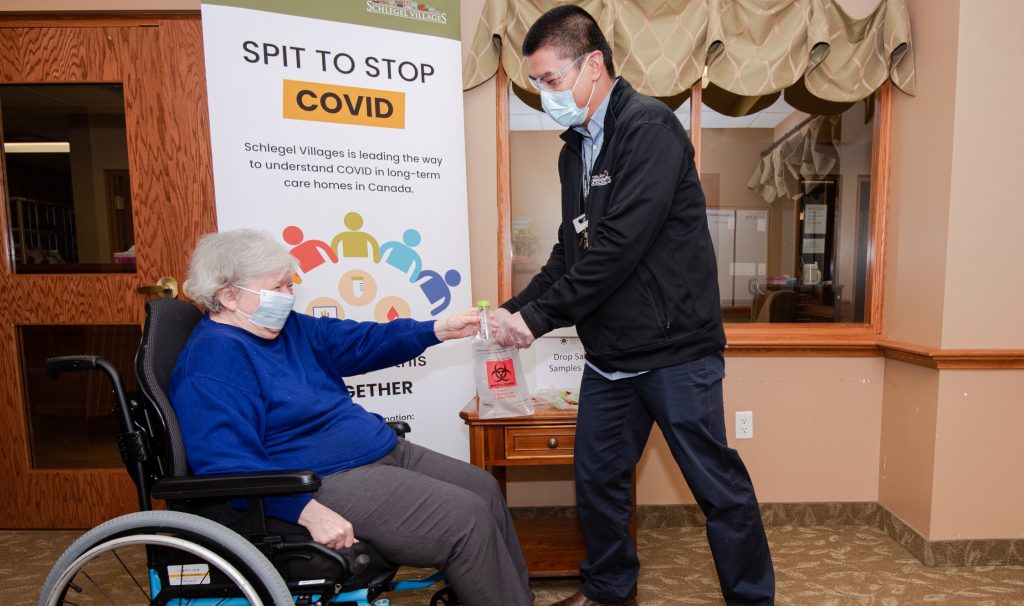Vaccines and long-term care: Large McMaster study receives $5M in funding

McMaster researchers are leading a large study to find out how well vaccination works in long-term care home residents, and which features of these homes may be directly linked with outbreaks. (Photo from Schlegel Villages)
March 18, 2021
Long-term care homes have been at the epicentre of the COVID-19 pandemic in Canada, with 70 per cent of COVID-19 deaths having occurred in long-term care or nursing homes.
Now McMaster researchers are beginning one of the largest single studies focusing on long-term care homes in Canada to find out how well vaccination works in residents in long-term care, and which features of these homes may be directly linked with outbreaks.
The Government of Canada, through its COVID-19 Immunity Task Force (CITF), is supporting the study with almost $5 million.
The project is part of Canada’s Global Nexus for Pandemics and Biological Threats, an international network based at McMaster, with scientists, clinicians, engineers, social scientists and other experts working collaboratively to prevent future pandemics and mitigate global health threats.
The new study, in partnership with Schlegel Villages, St. Joseph’s Health System, and Health Sciences North Research Institute, will involve more than 2,000 residents, staff, and visitors of long-term care homes in Ontario over the course of a year.
“These researchers will contribute to our understanding of COVID-19 and of vaccine-induced immunity in seniors living in long-term care homes, who have been disproportionately affected by the pandemic,” says Canada’s Chief Public Health Officer, Theresa Tam.
“Vaccines are a critical tool in our response, and this research will support their most effective use.”
The team will also determine what features of long-term care homes may be directly associated with outbreaks, and whether those homes with previous infections are likely to have future outbreaks.
“We aim to determine how well vaccination works in residents of long-term care homes and discover whether a resident’s previous exposure to the virus or immune system response can protect them or make them vulnerable to further infection,” said Andrew Costa, co-principal investigator of the study, and associate professor of health research methods, evidence, and impact.
“We’ll be mapping this information with other available data to better understand the spread of the virus and immunity across the province,” he said.
Outbreaks of infection can still be expected, despite widespread vaccinations, says co-principal investigator Dawn Bowdish, an immunologist and professor of medicine.
“Although most residents are dangerously susceptible to COVID-19, some are resilient. Learning about how the immune system helps some residents teaches us how to make better vaccines and protect residents from future outbreaks,” Bowdish said.
“Our research will influence health policy quickly because we are collaborating directly with provincial policymakers and COVID-19 decision-makers.”
The research team is working with scientific partners at the Ontario Ministry of Health, Public Health Ontario, Schlegel-UW Research Institute for Aging, the University of Toronto, the Health Sciences North Research Institute, St. Mary’s General Hospital and the University of Waterloo. PointClickCare Technologies and the Lung Health Foundation are supporting this research.
“Our team members and residents are proud to be part of this cutting edge and important study,” said James Schlegel, president and CEO of Schlegel Villages.
“The results of this research will contribute greatly to a more robust understanding of COVID-19 in long-term care homes and will help us keep residents safe and healthy into the future. We are honoured to work with the McMaster team and other partners to conduct this ground-breaking investigation.”
“This research project presents an important opportunity for our member organizations to continue to learn more about how COVID-19 is transmitted in long-term care homes and what effect vaccinations are having on transmission of the virus,” said David Wormald, president of St. Joseph’s Health Centre Guelph and St. Joseph’s Lifecare Centre Brantford, and vice-president of elder care for St. Joseph’s Health System.
“We have come a long way in our understanding of COVID-19 in the last year and the continued learnings will help in our fight against COVID-19 at St. Joseph’s Health System and beyond.”
“COVID-19 has taken an enormous toll on the elderly and studies like this one are needed so we can better protect them going forward,” said Allison McGeer, MD, CITF Leadership Group member. “We encourage teams to work with those who can use the findings and implement them quickly, such as government, public health authorities, and key long-term care facility operators. This study is doing that.”


